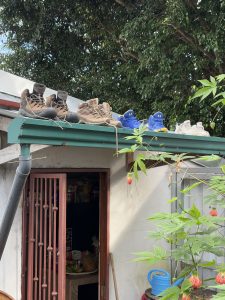
It turns out the roof is a great place to dry boots and shoes in Costa Rica.
The tap, tap, tap on the metal roof turned into pitter-patter-pitter-patter, and my mother-in-law and I looked at each other with an expression of urgency. The clothes we had hung outside on the line the day before hadn’t dried, and for fear of night-time rain we had brought them in, damp in their hamper near the back door. On this particular morning we had optimistically re-clipped them to the metal wire spanning the entire yard from the neighbors’ wall to the side of the house. It had dawned clear over the mountains, but seemingly out of nowhere the clouds had rolled in, and it was now raining in what should have been the first days of the dry season in Costa Rica.
In looking at our clothes and shoes and hiking boots in the backyard, it struck me that clothes-drying is a kind of microcosm for understanding vocation. Discerning vocation asks us to consider how we respond to a particular moment, within specific limitations and parameters. Our lives, routines, and identities start getting built around the ways we repeatedly respond to particular moments, with particular details, opportunities, limitations, and parameters. How do we respond when we depend on sunshine to dry our clothes, and it is now raining? We drop everything and run outside.
What other limitations and parameters do you notice that determine your daily vocations? Perhaps the cry of a baby or small child gets you out of bed each morning. Perhaps aches and pains determine the way you use stairs or inform an exercise and stretching schedule, or a larger illness forces you into an early retirement. How about other larger vocations? Perhaps housing prices influence your decision of whether to buy or sell. Or perhaps a particular injustice inspires you to work for societal change as a career or as a “side hustle.”
Middle class United States culture is pretty determined to prevent and mitigate as many limitations as possible. We purchase appliances to save time, program our smartphones to anticipate and complete tasks, and engage in as many “life hacks” as possible to maximize productivity. Our scientists look for ways to prolong life and increase crop yields, and our engineers seek out ways to get more mileage and battery life out of our technology.
And it’s true – some limitations are not fair or acceptable. As I was struggling to get my clothes dry this past rainy December, there were women in many countries of the world struggling to dry the rags they use to manage their menstruation. Overcoming such a limitation can mean the ability to finish school or find a job for millions of women and girls around the world.
Injustices and exploitation place unfair limits on the lives of so many: those without access to even public transportation, let alone an electric vehicle; those who live in food deserts, unable to access healthy food that sustains a healthy life; those who cannot access even basic health care and suffer from illnesses that many of us don’t think twice about. We as a society need to fix these limitations.
And yet, what happens when those of us who are allergic to limitations begin to embrace a few, or understand the opportunity that our limitations represent? On one of the mornings I spent rehanging damp clothes in Costa Rica, I heard the cacophony of screeching parakeets that gather in the trees of local parks in the city. The sound kept getting louder and louder as I clipped clothing to the line, and soon I saw huge clouds of perhaps one thousand parakeets in all flying across the blue sky, west to east, their screeches and silhouettes calling out the start of the day. A sight I would not have seen if not for my need to greet the sunny morning with clotheshanging. I exhaled, and felt a deep gratitude for such a day settle deep into my chest.
In a recent podcast of the Ezra Klein Show, Klein interviewed Oliver Burkeman, author of “Meditations for Mortals: Four Weeks to Embrace Your Limitations and Make Time for What Counts.”
In their conversation, Klein shared a meditation that he practices that reminds him of his finite nature, and Burkeman’s response concurred:
“So many of the things that we call “self-improvement” can be best understood as a structure of emotional avoidance so that we don’t have to feel how uncomfortable and claustrophobic it is to actually be who we are as finite individuals.
“…I think the point is that when you really begin to let it permeate you that we are of the nature to be finite, you get to exhale. You get to let your shoulders drop. Not in order to veg out but precisely to move forward to do the most meaningful things with your day. It’s a refocusing.”
What limitation have you been fighting in your life? What possibilities may open up if you embrace this limitation? What new gratitude, what new path, might become available to you? What unjust limitations can you become aware of, even as you seek to embrace your own finite nature?
Read more about our total dependence on the sun for food and energy on the Living Connected blog, written by Lutheran Deaconess and environmental engineer Katrina Martich, and engage in reflective practice on the gifts of creation.
- Deaconess Kat Peters, M.Ed., M.A., Assistant Director of the Institute for Leadership and Service
The Institute for Leadership and Service is dedicated to preparing students for lives of leadership and service—lives shaped by a sense of calling, equipped for thoughtful reflection, engaged in the larger world, and responsive to its deepest challenges.